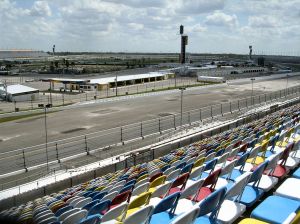NO FEES unless we recover money for you. |
Call 205-391-0618
Office Locations: Tuscaloosa Birmingham
Blog
Tuscaloosa Sports Fans May Assume Some Measure of Risk
Mar 7, 2013 - Dangerous Products/Liability, Tuscaloosa by Cross & Smith
Dozens of NASCAR fans were injured late last month when hunks of metal, a huge tire and other debris were hurled into the crowd at a Nascar Nationwide Series Race at the Daytona International Raceway as the cars were finishing their final lap.
Our Tuscaloosa personal injury lawyers understand that six people were rushed to a nearby hospital with serious trauma, while others were treated on the scene. Organizers praised the quick response of emergency crews on hand, but now several of those fans who were hurt are exploring their legal options for potential personal injury and/or premise liability claims.
One Florida law firm representing three of those individuals said the premise liability case would focus on the safety fence that lines the track of the speedway. Lawyers there say they will be focusing on the issue of gross negligence, which is that even when people possess liability waivers on their tickets, they don’t necessarily assume that a tire is going to fly into the stands and cause them severe injury. After all, the track is surrounded by a fence separating it from the stands.
The president of the track has said the fence has been repaired and anyone with concerns about up-close seating at future events would be given alternative options. Additionally, a similar crash at involving Carl Edwards in Talladega in 2009, prompted redesign and construction of the fence at Daytona. Again following this crash, NASCAR says outside experts, including those from Indianapolis Motor Speedway, will participate in a thorough review.
One of the most common defenses posed in claims of negligence based on premise liability – in Alabama and elsewhere – is that the plaintiff assumed the risk. The following is a summary of the factors relative to an assumption of the risk defense:
- You had actual knowledge of the danger;
- You both understood and appreciated the potential risks associated with that danger;
- You voluntarily exposed yourself to those risks.
Even if you don’t sign anything on your ticket, the ticket itself might be viewed as a contract through which you accept a certain level of risk.
So for example, a patron at an amusement park who has high blood pressure or other heart problems may assume the risk if he gets on a roller coaster anyway and then has a heart attack.
But this principal wouldn’t necessarily hold if that same ride somehow became unhinged or malfunctioned and that same patron was injured as a result. That’s not a scenario he would reasonably expect to unfold.
Often in these cases, it comes down to the appropriate degree of awareness that an organization or business should maintain of its operations at any given time and what, if any level of vigilance should be displayed by the patron.
Another potential claim in the case arising out of the incident at Daytona is a claim against the fence manufacturer, for failing to produce a product that would reasonably protect from debris going through it.
More common injuries at sporting venues include slip and fall accidents, those who are struck by an object and those accidents and injuries that occur while tailgating or in the parking lot.
Additional Resources:
NASCAR Fans Injured In Daytona Crash Explore Legal Options, Feb. 26, 2013, By Kyle Hightower, Huffington Post
Categories
- Amputation
- ATV/SUV Rollover Accidents
- Bessemer
- Birmingham
- Bus Accidents
- Car Accidents
- Construction Accidents
- Dangerous Products/Liability
- Defective Medical Devices
- Drunk Driving Accidents
- Firm News
- Medical Malpractice
- Motorcycle Accidents
- Nursing Home Neglect
- Personal Injury
- Pharmaceutical Litigation/Dangerous Drugs
- Premises Liability
- Train Accidents
- Truck Accidents
- Tuscaloosa
- Uncategorized
- Workers' Compensation/Work Injury
- Wrongful Death
Archives
Get a Free Consultation No Recovery. No Fee.
Hear What Our Clients Have To Say
"I have great respect for the lawyers at this firm and would recommend them to anyone. "
Posted By: Adam Freeman

